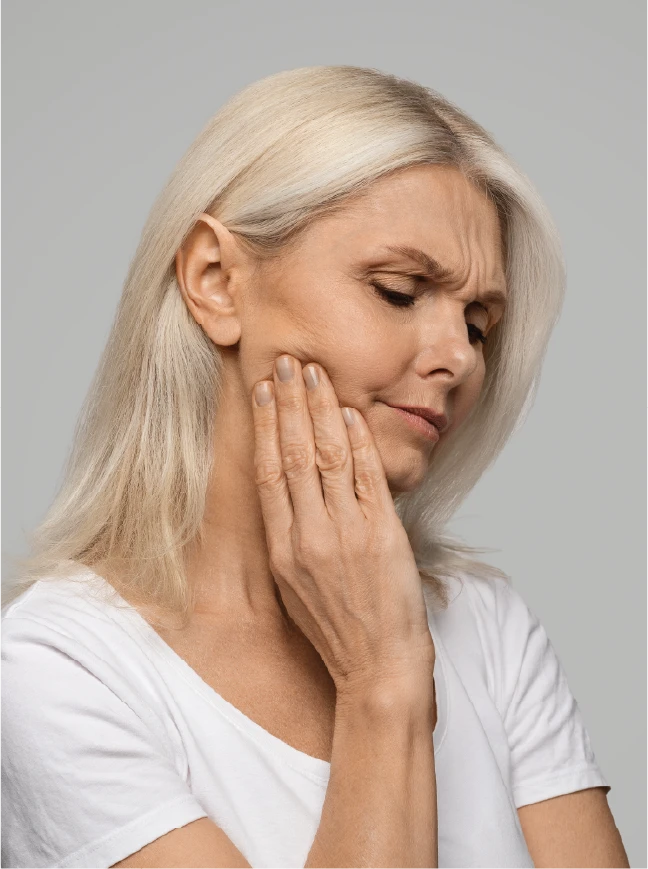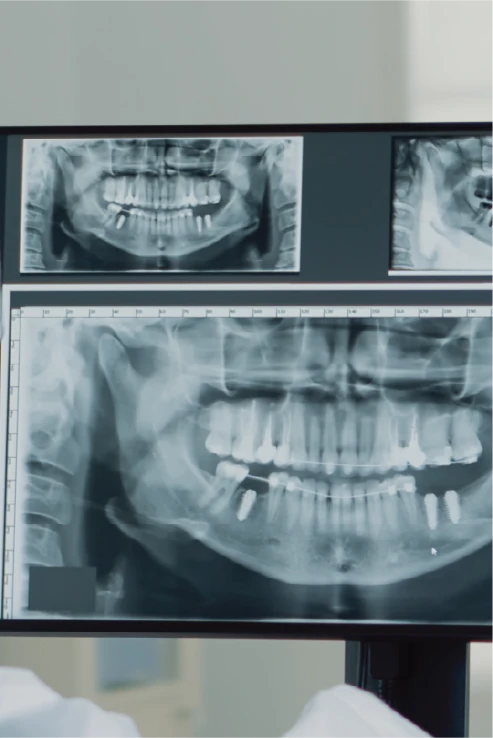
TMJ disorder can result from a variety of factors, often in combination, including:
Misaligned Bite (Malocclusion): When the upper and lower teeth do not fit together properly, it can put stress on the TMJ. Uneven bite forces can lead to jaw misalignment, muscle overuse, and chronic pain.
Bruxism (Teeth Grinding and Clenching): Excessive grinding or clenching, especially during sleep, can overwork the jaw muscles, leading to inflammation, joint strain, and even structural damage over time.
Jaw Trauma or Injury: Direct impact or accidents affecting the jaw joint, such as falls, sports injuries, or car accidents, can lead to dislocation, cartilage damage, or misalignment of the TMJ.
Arthritis: Conditions like osteoarthritis and rheumatoid arthritis can cause degeneration of the joint, leading to inflammation, stiffness, and impaired movement.
Poor Posture: Forward head posture, often associated with airway issues or excessive screen use, can create tension in the neck and jaw muscles, contributing to TMJ discomfort.
Stress and Muscle Tension: Emotional and physical stress can cause individuals to unconsciously clench their jaw, leading to persistent strain on the joint and surrounding muscles.
Hormonal Changes: Some studies suggest that hormonal fluctuations, particularly in women, may affect joint health, increasing the risk of TMJ disorder due to changes in ligament flexibility and inflammation.
Sleep Apnea and Breathing Issues: Airway obstructions and improper breathing patterns can contribute to jaw imbalances and excessive strain on the TMJ, exacerbating dysfunction over time.

A thorough diagnosis of TMJ disorder involves evaluating the jaw joint’s structure, muscle function, and bite alignment. This may include:
Clinical Examination: A specialist will assess jaw movement, muscle tenderness, and bite alignment.
Imaging Studies: X-rays, CBCT scans, or MRI imaging may be used to evaluate joint health and structure.
Bite Analysis: Assessing how the teeth come together can help determine if an imbalance contributes to TMJ symptoms.
Airway Evaluation: Since airway obstruction can contribute to jaw stress, a comprehensive assessment may include airway health screening.
At Face Focused Orthodontics, we understand that TMJ disorder is often linked to an imbalanced bite and improper jaw alignment. Through specialized orthodontic treatments, we can help correct these issues and alleviate symptoms.
1. Bite Correction and Alignment
A misaligned bite (malocclusion) can place excessive stress on the TMJ. Orthodontic treatment, such as Invisalign or braces, can reposition the teeth and jaws into a more balanced alignment, reducing strain on the jaw joint.
2. Expanding the Upper Jaw for Better Function
In some cases, a narrow upper jaw can contribute to TMJ issues by causing improper occlusion (bite interference) and airway obstruction. Techniques such as bone-anchored expansion (MSE or MARPE) help widen the upper jaw and improve both function and breathing, indirectly reducing TMJ stress.
3. Space Coordination and Improved Occlusion
Our approach, known as Precision Space Management, helps to guide the teeth and jaw into a position that prevents excessive strain on the TMJ. By controlling diastema closure and space management during treatment, we ensure a stable and functional bite.
4. Myofunctional Therapy and Oral Posture Training
Poor oral habits, such as tongue thrusting or incorrect swallowing patterns, can impact jaw function. We collaborate with myofunctional therapists to retrain proper oral posture, which can support TMJ stability and reduce symptoms.
5. Splint Therapy and Stabilization
For patients experiencing severe TMJ pain, custom splints or occlusal guards may be recommended to relieve joint pressure. These appliances help relax the jaw muscles and prevent further damage from clenching or grinding.

Palliative Care Therapy for TMJ: Palliative care focuses on relieving symptoms and improving quality of life. This approach includes the use of heat and cold therapy, gentle jaw exercises, soft diet recommendations, and non-invasive pain management techniques to alleviate discomfort without altering the structure of the jaw.
Physical Therapy: Exercises and manual therapy can help improve jaw function and reduce pain.
Stress Management: Since stress contributes to clenching and muscle tension, relaxation techniques such as meditation and biofeedback can be beneficial.
Botox Injections: In cases of severe muscle tension, Botox injections can provide temporary relief from excessive jaw clenching.
Surgical Intervention: While rare, severe cases of TMJ disorder that do not respond to conservative treatments may require surgical correction.
While orthodontics plays a crucial role in improving TMJ disorder, we take an interdisciplinary approach that may include collaboration with physical therapists, myofunctional therapists, and other specialists. Addressing the root causes of TMJ dysfunction ensures long-term relief and overall health improvement.
If you or a loved one are experiencing symptoms of TMJ disorder, schedule a consultation with Face Focused Orthodontics. Our team will evaluate your jaw function, bite alignment, and airway health to create a personalized treatment plan aimed at relieving pain and restoring optimal function.
Contact us today to learn more about our innovative, airway-centered approach to orthodontic care!